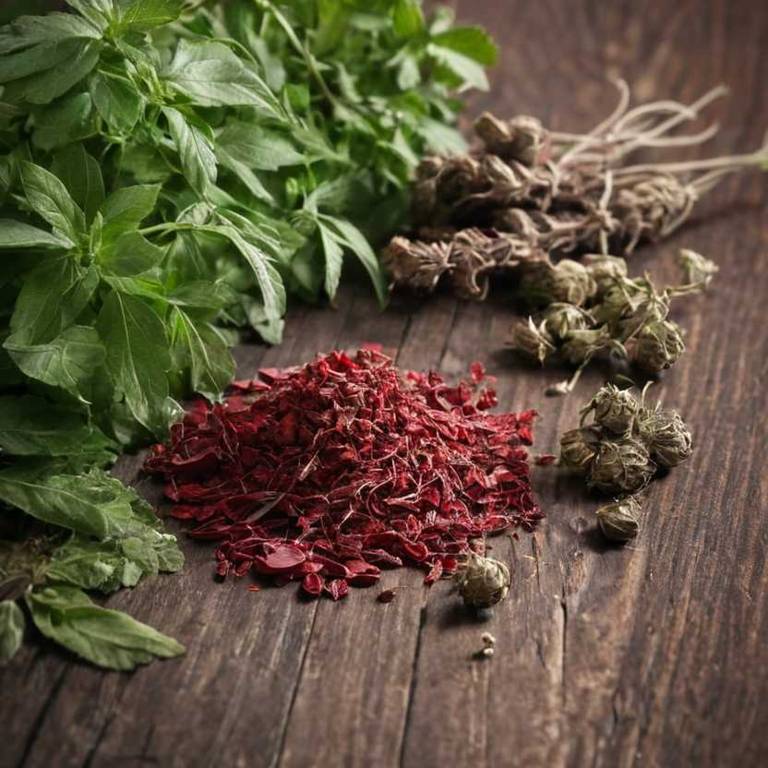By Leen Randell
Updated: Jul 07, 2024
10 Health Benefits Of Ulmus Rubra (Slippery Elm)

Ulmus rubra, also known as slippery elm, has health benefits such as soothing digestive issues, reducing inflammation, and promoting wound healing.
The plant's mucilaginous properties, containing mucilage, provide a protective barrier on the mucous membranes, reducing irritation and discomfort.
These benefits can improve people's lives by alleviating symptoms of irritable bowel syndrome, reducing pain and inflammation, and facilitating faster healing of wounds, allowing individuals to recover more efficiently and maintain a higher quality of life.
This article explains in details the 10 best health benefits of Ulmus rubra.
1. Soothes digestive issues
Ulmus rubra soothes digestive issues because its mucilages coat and protect the gastrointestinal tract, reducing inflammation and irritation.
The plant's anti-inflammatory properties help to calm acid reflux, gastritis, and ulcerative colitis symptoms, while its demulcent properties lubricate the digestive tract, easing symptoms of irritable bowel syndrome (IBS) and Crohn's disease.
This natural remedy has been used for centuries to alleviate digestive discomfort and promote overall gut health.
2. Reduces inflammation
Ulmus rubra reduces inflammation because it contains mucilages and polysaccharides that inhibit the production of pro-inflammatory cytokines and eicosanoids.
These bioactive compounds work synergistically to suppress the activation of inflammatory cells, such as macrophages and neutrophils, thereby reducing the severity of inflammatory responses.
Additionally, slippery elm's anti-inflammatory properties may also be attributed to its ability to scavenge free radicals and protect against oxidative stress.
3. Heals mouth and throat irritation
Ulmus rubra heals mouth and throat irritation because of its mucilaginous properties.
When ingested or applied topically, the gel-like substance coats and soothes irritated tissues, reducing inflammation and discomfort.
Slippery elm's anti-inflammatory and antioxidant compounds also help to combat the underlying causes of irritation, such as bacteria, viruses, or environmental factors, promoting a speedy recovery from conditions like mouth sores, sore throats, and tonsillitis.
4. Relieves cough and sore throat
Ulmus rubra relieves cough and sore throat because of its unique mucilaginous properties.
The inner bark of the tree contains a gel-like substance that forms a soothing film on the affected area, providing instant relief from inflammation and discomfort.
This protective barrier calms irritated tissues, reducing redness and swelling, while also coating and shielding the respiratory tract from further irritation, ultimately alleviating coughing fits and sore throats.
5. Promotes healthy skin
Ulmus rubra promotes healthy skin because of its rich antioxidant and emollient properties.
The inner bark of the tree contains mucilages that soothe and calm irritated skin, reducing inflammation and redness. Additionally, the antioxidants present in slippery elm help to protect the skin from environmental stressors and damage caused by free radicals, promoting a radiant and healthy complexion.
This natural remedy has been used for centuries to treat various skin conditions, including eczema, acne, and wounds.
6. Aids in wound healing
Ulmus rubra aids in wound healing because of its unique mucilaginous properties.
The gel-like substance extracted from its inner bark forms a protective barrier that shields wounds from bacteria and other contaminants, reducing the risk of infection. Additionally, slippery elm's anti-inflammatory compounds help to soothe and calm irritated tissues, promoting a conducive environment for healthy tissue growth and repair.
This natural remedy has been used for centuries to support wound healing and promote skin integrity.
7. Regulates bowel movements
Ulmus rubra regulates bowel movements because of its mucilaginous properties.
The plant's inner bark contains a gel-like substance that soothes and protects the mucous membranes lining the digestive tract, reducing inflammation and irritation.
This helps to normalize bowel function, alleviating symptoms such as constipation, diarrhea, and irritable bowel syndrome (IBS).
8. Eases symptoms of ibs
Ulmus rubra eases symptoms of irritable bowel syndrome (IBS) because of its soothing and anti-inflammatory properties.
The inner bark of the tree contains mucilage, a thick, protective coating that forms when it comes into contact with water. When ingested, this mucilage helps to calm inflammation in the digestive tract, reducing cramping, bloating, and diarrhea associated with IBS.
Additionally, slippery elm's gentle demulcent properties help to coat and protect the lining of the intestines, providing relief from symptoms such as abdominal pain and constipation.
9. Lowers cholesterol levels
Ulmus rubra lowers cholesterol levels because of its unique combination of soluble fibers and mucilages.
The soluble fibers in slippery elm help to bind to bile acids and remove them from the body, which reduces the amount of cholesterol produced in the liver. Additionally, the mucilages in slippery elm have been shown to inhibit the absorption of dietary cholesterol, further reducing overall cholesterol levels.
This dual action makes slippery elm a natural and effective way to lower cholesterol levels and support cardiovascular health.